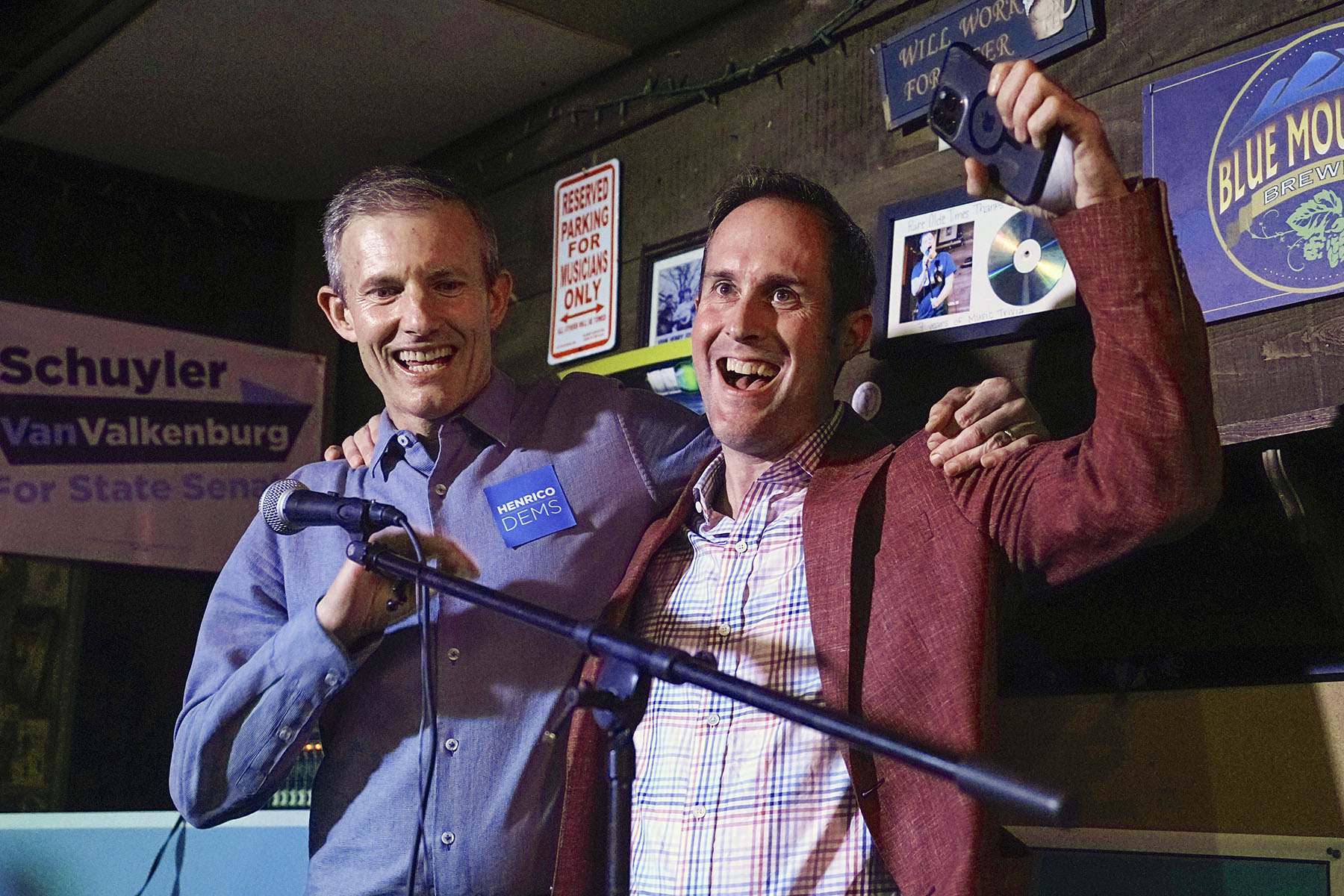Your trusted source for contextualizing the results from Election Day 2023. Skip the algorithm and sign up for our daily newsletter.
Virginia voters on Tuesday handed Democrats control of the state legislature in a stunning rebuke to the state’s Republican governor Glenn Youngkin, who had promised to levy a 15-week abortion ban if voters gave him the legislative power to do so.
Late Tuesday night, projections from Decision Desk HQ showed Democrats holding onto their Senate majority and wresting control of the House from Republicans. Such power will allow Democrats to block Youngkin’s agenda, effectively neutralizing a Republican rising star with presidential aspirations during his last two years in office.
The outcome of Virginia’s legislative elections, alongside the abortion referendum in Ohio, sends a powerful message to the nation about how much voters are prioritizing reproductive freedom at the ballot box heading into 2024. Democrats’ strategy to center abortion rights in an election where abortion wasn’t directly on the ballot proved powerful enough to restore the party’s power in the legislature after a “red wave” in 2021.
Republicans led by Youngkin had largely coalesced around a 15-week abortion ban with some exceptions, and made the case to voters that such a measure was a “common sense,” consensus approach. The outcome of Tuesday’s election suggests that even such a measure in a state with few restrictions may be anathema to most voters — and that the strategy may not be effective at insulating the party from an issue that has become politically costly.
-
Read Next:
With control of the legislature, Virginia Democrats will remain a “brick wall” against state Republicans’ conservative agenda, including more state government control over public school curriculums, restrictions on trans youth participation in sports, and other issues like tax cuts and climate change policy.
“It’s official: there will be absolutely no abortion ban legislation sent to Glenn Youngkin’s desk for the duration of his term in office, period,” said Sen. Mamie Locke, who leads the Democrats in the Senate. Locke and fellow Senate Democratic leaders raised bricks in the air while declaring victory to signify the wall that will block Republicans’ agenda.
“Virginia voters said they want to keep Virginia a safe haven for abortion rights, voting rights, workers’ rights, justice reform and LGBTQ rights, and that is exactly what they will get.”
All 140 seats in the Virginia legislature were up for grabs this election cycle, but control of the chambers came down to a handful of seats in the House and Senate.
In the Richmond suburbs, voters unseated Republican Sen. Siobhan Dunnavant, a practicing OB-GYN who spent much of her campaign defending her strong support for abortion restrictions at 15 weeks of pregnancy. Dunnavant, who had served in the legislature since 2016, backed exceptions for rape, incest and to protect the pregnant patient’s life, and parted with most of her colleagues in also backing an exception for severe fetal anomalies.
“Not a ban, but legislation that reflects compassionate common sense,” Dunnavant said to describe her position.
At a polling place in Dunnavant’s district, Heidi R., 56, said she came out to vote on Election Day “almost strictly to keep Dunnavant from being elected to another term.”
The Henrico County resident, who spoke on condition that her full name not be used, said she and Dunnavant both attended a local Catholic parish and that based on their interactions, she doesn’t believe Dunnavant would stick to a 15-week abortion ban if given the opportunity to go further. She has also taken issue with Dunnavant’s statements around “late-term abortions.”
“She is an OB — she knows that elective late-term abortions don’t really happen,” Heidi said. “I’m Catholic, too. I would never get an abortion. When I was pregnant, I didn’t even get the tests for [fetal anomalies]. But it’s not for me to make that decision for you.”
Voter Carolyn Bisler, 77, said she supported Dunnavant and other Republicans on the ballot, primarily based on concerns over public safety. She said she doesn’t mind some state-level restrictions as long as the procedure is available in certain cases.
“Fifteen weeks — I think you should be able to make up your mind in that length of time,” Bisler said. “That still gives women their right to choose.”
In the Northern Virginia suburbs, a Senate district anchored in Loudoun County, a national epicenter for the education culture wars, Democrat Russet Perry was projected to defeat Republican Juan Pablo Segura. Segura’s campaign confirmed the candidate supports Youngkin’s 15-week proposal, but said such a policy does not amount to a “ban.”
Virginians also voted to elevate Danica Roem from the state House to the Senate, making her the first openly trans person elected to the state’s upper chamber. Roem fended off Republican Bill Woolf in a multimillion-dollar, highly competitive race.
Roem said her opponent targeted her with mailers, radio and TV ads, focusing on trans girls’ participation in youth sports and describing Roem’s support for gender-affirming school policies as “reckless ‘boys in girls’ spaces’ policies.”
In Northern Virginia, a Republican in a competitive House race who was recorded saying he “would support a 100 percent ban” on abortion, John Stirrup, was defeated by his Democratic opponent.
Democrats’ wins Tuesday mean the party will continue to block GOP efforts to dictate how schools will accommodate trans students — an issue Youngkin directly campaigned on — and will protect Virginia’s nondiscrimination protections for LGBTQ+ people, its ban on conversion therapy and hate crime laws that cover sexual orientation and gender identity.
A handful of races remained too early to call, meaning Democrats’ majorities could grow further.








